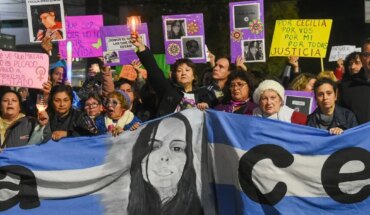María de la Concepción Sibaja Ramírez has just spent her sixth New Year separated from her family, imprisoned for crimes that have not proved her and without sentence. The case has been completely standing for three years because neither the expert nor the alleged victim of human trafficking for which criminal case 131/2015 was opened has not been filed, in the hands of the Seventh District Judge in Oaxaca, and with the emergency by the COVID-19 pandemic it is even further away that it will move forward.
But he’s in jail because he signed a confession. Yes, she signed it because she claims that the elements of the then Attorney General’s Office of the Republic (PGR, now the Prosecutor’s Office) who arrested her were physically, sexually and psychologically tortured for hours, groned her since she was apprehended and threatened to harm her children. The latter, above all, doubled her to accept anything.
However, the ex officio lawyer who has handled his case told him not to report torture, because the application of the Istanbul Protocol to verify it was going to make things more late, and although he has stated it in writing, the judge has not taken it into account in investigating and discarding that confession.
His case has just been resumed for the documentary “Cana”, on torture of incarcerated persons, and by the organization Institute of Criminal Procedural Justice (IJPP). In Mexico, 64% of people who have been arrested experienced physical violence in this process. In addition, women or LGBTIQ+ people are victims of sexual torture by state agents up to four times more than men: 72% of human rights complaints from women in detention include such acts.
Mary’s voice is cut short when she recalls the vexes she suffered in her detention, in a telephone interview with Political Animal from the femenil prison of Tanivet, 35 kilometers from the city of Oaxaca.
“Since I was arrested, I was told that I had to declare myself confessed to that. At first I asked why I had been arrested, with many rudenesses I was told that, because I was engaged in the trafficking of undocumented people with my ex-wife and with other people, and that I had to accept it… other hand, they were going to go get my kids. I told them yes, that I was going to say what they told me… but don’t do anything to my children. that I was going to say what they told me to say,” he says sobbing.
“Then they started groping me. From there they took us for a while to the PGR here in Oaxaca, and took us to SEIDO (Specialized Sub-Procedure in Organized Crime Research) by road. On the way to Mexico they took me alone, two men were going, one on each side of me, behind the car, another two ahead, the one I was driving and the other. And they groping me, too. They couldn’t rape me because I was menstruating. And so they told me, that that had saved me because they were disgusted.”
He would then learn that nine other women had been arrested on the same criminal case and that several of them were raped. Another, she says, was eight months pregnant, so the baby was taken out and threatened to leave her in a DIF shelter instead of her family to force her to sign her confession.
When Maria found herself in a dungeon in Mexico City, she thought that nightmare was going to be over soon because she hadn’t done anything. But it was just getting started.
From trying to migrate to being accused of being accused of trafficking
The crimes for which Maria has been imprisoned for just over five years are human trafficking and organized crime, for allegedly belonging to a transnational organization that crossed Central American migrants to the United States, and which was disarticulated in a joint operation between that country, Mexico, Guatemala and El Salvador.
But the timeline of the alleged facts doesn’t even make sense to those who analyze the case. In 2012, Mary crossed the border without papers, was intercepted and deported; the IJPP believes that there may be the key, in which his name has been recorded and in the papers he signed without even understanding, because some were in English.
She returned to her native Oaxaca, where she lived quietly for three years, until in August 2015 federal agents came to look for her and took her back. But the criminal case was for events allegedly occurring in 2010, reported by a protected witness, of which for that reason there is no further information, and with a Salvadoran woman as a supposed victim, who has never appeared to the hearings. Only the PGR’s addition in the United States was the one that provided its statements.
“It seems that what they did was fabricated allegations of migrants who were detained against others or others who were also detained, and turn some victims and others into victims,” explains IJPP project coordinator Araceli Olivos.
Maria says they were just looking for people to stop. That when she was being taken away and her sister tried to defend her, she heard an agent ask if she was carrying the sister too, but that the boss answered no because there were already many.
He later learned that there is an arrest warrant for the same matter against the eldest of his three children, 28, and that his ex-wife was also arrested, while his ex-father-in-law was left alone because he was over 90 years old, but he was rooted in the properties he had. In fact, she says, it was the new partner of her ex-wife who pointed her out, when the agents asked who else was related to that house, even though she had been separated for more than 10 years.
Among the other nine women who were arrested and transferred to the SEIDO on the same dates as her were two who did have to do with her ex-wife. But the others had never been seen in their lives, they did not even live in the same place, since some are from Salina Cruz and others from the state of Guerrero.
Among the latter is Lucía Baltazar, a student for which there has been a movement to ask for her innocence, whose name even reached the list of prisoners of conscience prepared by Senator Nestora Salgado to benefit from the amnesty promoted by presidency, but which is still not applied.
Three criminals and different judges without further evidence
After her confession, Maria was admitted to Tepic’s femenil federal prison, Nayarit, and a month and a half later, on a mass transfer she was transferred to Morelos, to the penalty known as CPS number 16, where she spent nearly three years. Meanwhile, he counts, he spent two years without a formal prison order, a year there was not even a judge assigned to the case, then the matter was sent to Torreón and returned to Mexico City. In the morelos prison, he relived sexual humiliations.
“They denigrate such a horrible one, they yell at him, make him go around, do naked squats to be making fun of our bodies. But if the doctor likes the person’s body, he makes her go around again, to do squats… I don’t know why they do that, I don’t know what they win!” he laments.
Araceli Olivos explains that sexual torture shows that the justice system reproduces a sexist and patriarchal social scheme.
“It continues to cosify women, now in a context of torture, by exerting violence against them from attacking their sexuality, and always putting women’s sexuality, because that would put them in a situation of constant vulnerability. So women are not sure, obviously, either in front of state agents, who are going to use what they think may be most devastating to the person they are torturing to serve their purposes,” she says.
The case eventually moved to a courthouse in Salina Cruz, Oaxaca, although it has remained in the same status: with the written statement of a victim who never showed up and that of a protected witness who, according to Olivos, is a figure who for his opacity has lent himself to the manufacture of culprits.
The activist criticizes that when there is a torture complaint, the first thing the judge or judge has to do is listen to the affected person and check if the story is consistent with how the detention occurred, ask for certification of whether there were injuries, or even look for a family member was a witness; but they often hide by saying that then prosecutors are the ones who have to re-investigate. The worst part is that in case there is indeed torture, confessions should be discarded and the process replenished, but this does not usually happen.
María de la Concepción also managed, after three years in prison in Morelos, to be transferred to the penal of Tanivet, in her state, which hosts less than 200 prey from the common and federal jurisdiction, and where she was finally able to visit her family, although her life has already fallen apart a little: who was her partner left the relationship, her mother is sick and increasingly difficult to visit her , neither can her eldest son who has an arrest warrant, and she once again was not at the Christmas festivities or on the 24th birthday of the youngest of her daughters, which was also in December.
“We were a family that every moment we celebrated. And it’s been hard… too much,” he laments.
“The graduate told me that he is now leading my case (private attorney), which I would ask for for them. And I said, all I ask is for them to spend the same years that I’m going through, so they can see what it’s like to lose important moments in my family’s life. I wouldn’t even want them to be groping, as they groping me; sunslowly a little bit that they passed the same thing I went through.”
What we do at Animal Politics requires professional journalists, teamwork, dialogue with readers and something very important: independence. You can help us keep going. Be part of the team.
Subscribe to Animal Politics, receive benefits and support free journalism.#YoSoyAnimal
translated from Spanish: Maria was arrested without evidence and has been imprisoned for five years without a sentence
January 13, 2021 |





